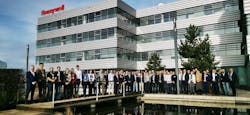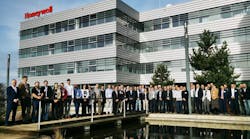Honeywell Launches Disruptive Research on Hydrogen Fuel Cells for Aircraft
A consortium led by Honeywell met recently to launch a European Clean Aviation project that will develop a new generation of hydrogen fuel cells for the aviation industry. Project NEWBORN will involve multidisciplinary collaboration between 18 partners from 10 European countries to develop an aerospace-qualified megawatt-class fuel cell propulsion system powered by hydrogen.
Green hydrogen, the term given to hydrogen produced by splitting water into hydrogen and oxygen using renewable electricity, is an extremely clean power source that can be used to propel future aircraft, which makes it appealing as the aerospace sector works to reduce carbon emissions. The megawatt-class fuel cell propulsion system delivered by NEWBORN will give birth to future, sustainable aviation beyond a megawatt. The final demonstrator will be integrated and tested by Pipistrel Vertical Solutions, a Slovene-based disruptive general aviation manufacturer.
“Achieving aviation’s transformation to climate-neutral requires a comprehensive arsenal of disruptive solutions that will bring momentous gains in aircraft energy efficiency coupled with low- or zero-carbon energy sources,” said Axel Krein, executive director of Clean Aviation. “With the launch of NEWBORN we can kick-start the necessary work to drive a step-change in aircraft performance and deliver EU Green Deal ambitions for net-zero flight.”
“Our priority is creating realistic solutions to make flying sustainable. NEWBORN is pushing the boundaries of current hydrogen fuel cell research by establishing a hydrogen hybrid powertrain that employs Pipistrel’s batteries with liquid hydrogen-powered fuel cells at megawatt levels,” said Tine Tomažič, chief technology officer, Pipistrel Vertical Solutions. “It’s an honor to be working alongside our industry partners on a project that opens up truly exciting possibilities.”
“Honeywell is dedicated to helping our customers achieve environmental targets through technologies that make our world more sustainable and better connected,” said Kurt Shewfelt, senior director, Breakthrough Technology Initiatives, Honeywell Aerospace. “We are proud to work with our project partners on innovative, new technology that will help integrate hydrogen propulsion on commercial aircraft and contribute to a more sustainable future for aviation.”
Work on NEWBORN will be performed at the Honeywell Technology Solutions research and development center in Brno, Czech Republic, and at other Honeywell and project-partner sites across Europe.
Clean Aviation Joint Undertaking, the European Union’s research and innovation program for transforming aviation toward a sustainable and climate-neutral future, will fund €700 million over 20 selected groundbreaking sustainability projects in response to its first Call for Proposals for disruptive technology research to power the climate-neutral aircraft of the future. Project NEWBORN was the No. 1 ranked project in the first Call for Proposals, receiving the highest score by the selection committee.



